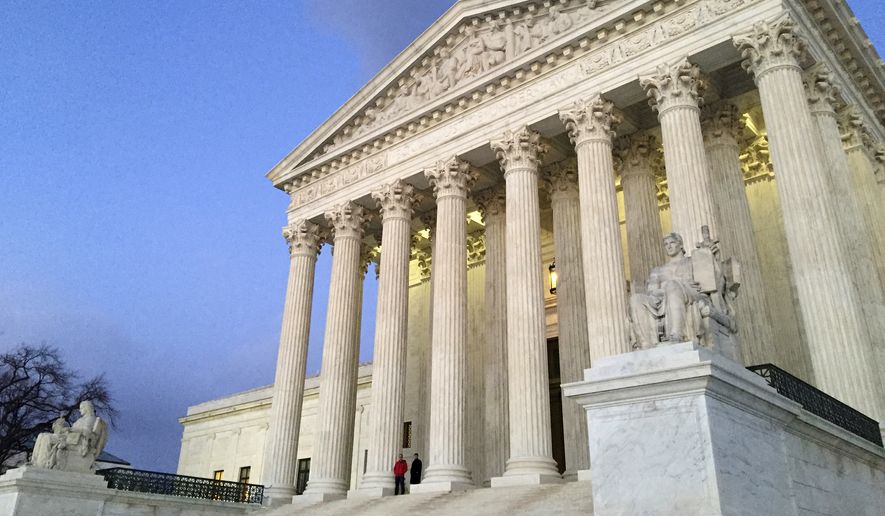The Supreme Court ruled Monday that a state cannot refuse to fund a church’s secular activities just because it is a religious institution, in a decision Christian conservatives hailed as a major win for religious freedom.
The 7-2 decision clears the way for a Missouri church to resurface its playground with money from a state fund set aside specifically to make playgrounds safer for kids.
But the ruling’s implications could stretch far beyond Trinity Lutheran Church, suggesting new avenues for religious organizations to gain access to government funds as long as they are aimed at a secular purpose.
Chief Justice John G. Roberts Jr., writing for the majority, insisted the ruling doesn’t open the floodgates, saying the decision will likely prevent “a few extra scraped knees.”
“The exclusion of Trinity Lutheran from a public benefit for which it is otherwise qualified, solely because it is a church, is odious to our Constitution all the same, and cannot stand,” the chief justice wrote.
But others warned the court was treading on dangerous ground. Justice Sonia Sotomayor said it marked the first time the court has ordered the government to send money to a church.
“To hear the Court tell it, this is a simple case about recycling tires to resurface a playground. The stakes are higher. This case is about nothing less than the relationship between religious institutions and the civil government — that is, between church and state,” wrote Justice Sotomayor, in a searing dissent joined by Justice Ruth Bader Ginsburg,
Trinity had sought money from Missouri under the state’s playground refurbishment program, but the state said a 19th century rule, known as the Blaine Amendment, excluded funds from going to religious schools. More than 30 states have adopted a Blaine Amendment provision.
The court majority on Monday — a striking coalition of the court’s five Republican-appointed justices and two Democratic-appointed justices — ruled those policies cannot be used to prevent secular funds from going to churches as long as the purposes are purely secular.
Michael Farris, president and CEO of Alliance Defending Freedom, which represented the church in the case, called the ruling “mainstream.”
“The upshot of this case is that religious discrimination is no longer viable in this country,” said Mr. Farris. “This is coming back to a more moderate position where we’re seeing religious people being treated just like everybody else.”
But Barry Lynn, executive director of Americans United for Separation of Church and State, said he doubts the court is ready to outright overturn states’ Blaine amendments.
“It’s very dangerous when you have a Supreme Court rejecting a state’s own interpretation,” he said.
Chief Justice Roberts stressed the limited nature of his ruling, writing in a footnote that the case addressed funding of a playground — nothing further.
“This case involves express discrimination based on religious identity with respect to playground resurfacing. We do not address religious uses of funding or other forms of discrimination,” the footnote read.
That drew a dissent from Justices Clarence Thomas and Neil M. Gorsuch, who agreed with the rest of the ruling but couldn’t abide by the footnote, which they said seemed to suggest that playground money was the only source of funding that can’t be restricted.
Justice Gorsuch went further, saying the court could be creating an impossible distinction for states and the federal government, making them have to peer into the motives and nature of a church’s actions.
“Is it a religious group that built the playground? Or did a group build the playground so it might be used to advance a religious mission?” Justice Gorsuch wondered. “The distinction blurs in much the same way the line between acts and omissions can blur when stared at too long, leaving us to ask (for example) whether the man who drowns by awaiting the incoming tide does so by act (coming upon the sea) or omission (allowing the sea to come upon him).
“Neither do I see why the First Amendment’s Free Exercise Clause should care,” he concluded.
For now, legal scholars were left to parse how far the chief justice intends for his decision to go.
Freedom From Religion Foundation, which joined an amicus brief against Trinity Lutheran, warned the ruling could open the floodgates for tax dollars going toward churches.
“Seven justices turned their backs on the hallowed principle that citizens should not be forced to financially support churches and church schools,” the organization’s statement read.
Nathan Diament, executive director at Washington, D.C.’s Orthodox Union Advocacy Center, who filed an amicus brief backing the church, said this ruling could stretch beyond playgrounds and impact other kinds of safety and security programs.
David Cortman, an attorney for Alliance Defending Freedom who argued on behalf of the church, said the decision applies to any neutral program open to everyone including aging facilities, public and private school safety programs and medical programs for children.
But Elliot Mincberg, senior fellow at People for the American Way, disputes there will be a broad impact.
“It’s very clear the majority wants to limit this case to these particular kinds of facts,” he said. “The verdict is ’to be continued.’ We’re going to have to see what happens in other cases.”
• Alex Swoyer can be reached at aswoyer@washingtontimes.com.




Please read our comment policy before commenting.